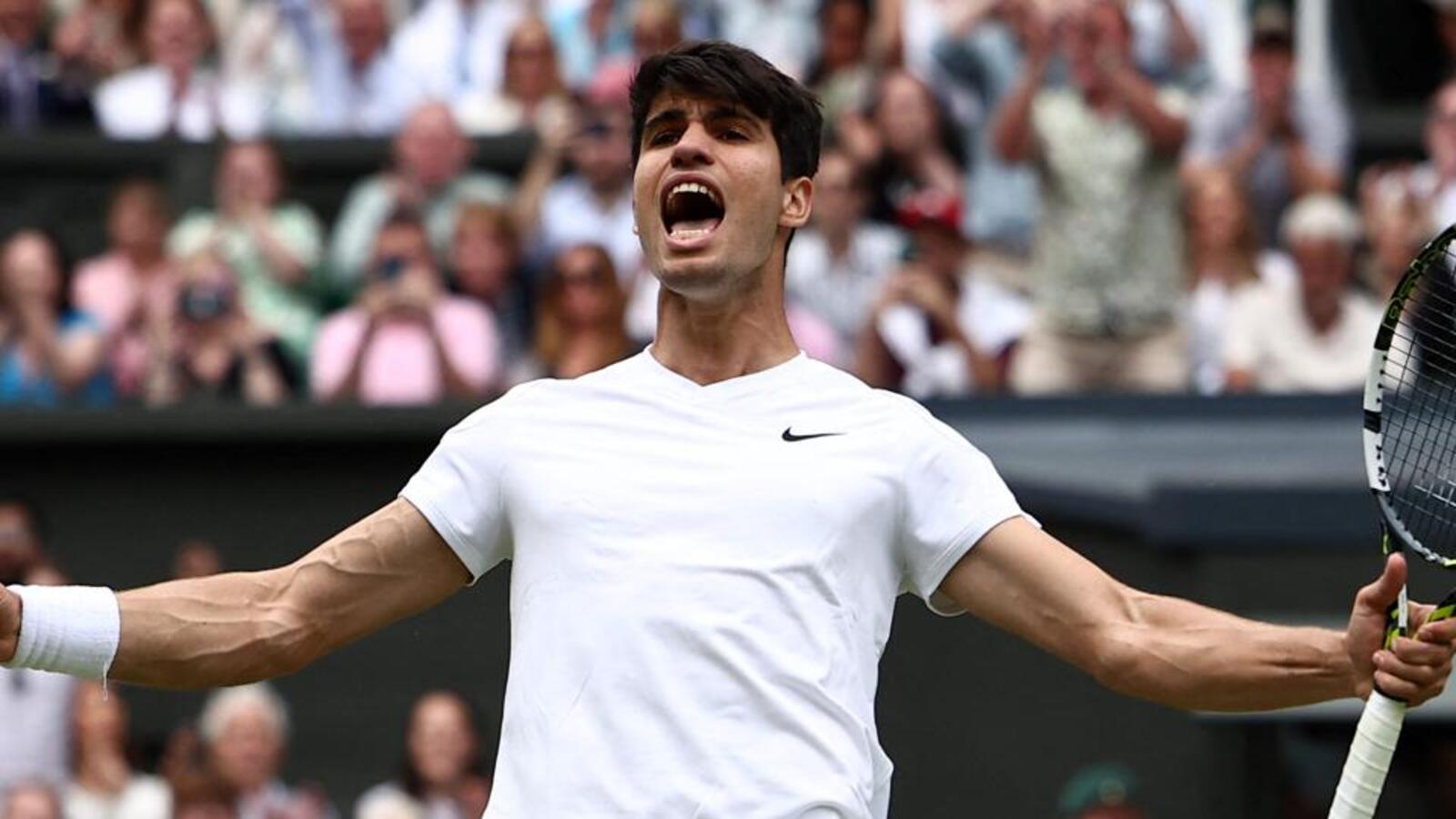


Mumbai: Carlos Alcaraz, the defending Wimbledon and reigning French Open champion, has by no means brought his best tennis to the lawns of London. Far from it. His on-court movement isn’t quite as sharp, the thinking not as precise and, surprising coming from a three-time Grand Slam champion, battled nerves in the semi-final.
Yet, Alcaraz finds himself in the Wimbledon final for the second year running. That, after a 6-7(1), 6-3, 6-4, 6-4 victory on Friday against Daniil Medvedev in a semi-final show that summed up the Spaniard’s last couple of weeks — scrappy yet successful.
What explains it? Sure, the inability and ineffectiveness of his opponents to pounce on Alcaraz dropping more than double the sets en route to the final this year compared to the last (he lost two) is one. It’s also about a trait the 21-year-old is starting to show, one that separated the rest from the Big Three kind: finding a way to win even on days, and in tournaments, that you’re not at your best.
“That’s the difference between a good player and a champion,” Indian tennis legend Vijay Amritraj said on Thursday. “Anybody can win when they’re playing well. It’s when your back is up against the wall and you’re having a bad day in the office, (it’s about) how you are going to deliver then and win at all costs.”
Which, in this Wimbledon, Alcaraz has. He’s overcome a five-set scare from Frances Tiafoe in the third round, a third set drop in concentration against Ugo Humbert in the fourth and an opening set edge by Tommy Paul in the quarters.
In the semis against Medvedev, nerves hampered Alcaraz for a set and a bit. “I started really, really nervous. He was dominating the match…it was difficult for me,” Alcaraz said on court. “After the beginning for the second set, I could play my own game and enjoy little bit more.”
Medvedev, who took down Jannik Sinner in the semis, came into the match having beaten his younger opponent the last time they played in a Slam (2023 US Open semis). At Wimbledon where they met in the same round last year, however, Alcaraz blew him away while giving him just nine games.
The start signalled that this wouldn’t be all one-way traffic, what with the rash of breaks in the first set. Although Medvedev’s serve was immediately under pressure in the opening game, he got the first break to love in the fourth game after a wide forehand from Alcaraz.
That opened the floodgates. In the next game, Alcaraz won a point with some mind-boggling defence, putting balls back into play that ought to have been outright winners. Two points later, out came a drop shot winner and at the fourth time of asking in that game, Alcaraz struck back. But with Alcaraz’s first serves eluding him — down to a low 48% in the set — and his on-court movement not as fluid, Medvedev grabbed another break.
With Medvedev serving for the set, Alcaraz sensed an opening. A backhand up-the-line winner, a thunderous forehand return and another drop winner, which needed the chair umpire to step in, kept the set going. The “not up” call — the ball appeared to have bounced twice before a lunging Medvedev’s racquet got to it — by the umpire invited the ire of the mercurial Russian, who received a code violation and unsportsmanlike conduct warning.
Moments like those usually send Medvedev’s mind into a spiralling freefall. Here he held it together. In the tiebreaker where Alcaraz was still serving cold and Medvedev returning hot — like that forehand down-the-line return winner to go 3-0 up — the Russian dropped just one point.
Medvedev was coming to the net a lot more on the day, perhaps to take Alcaraz’s attacking rhythm away and the initiative on his racquet. The strategy yielded mixed results. It particularly cost him in the fourth game of the second set, where Medvedev cut a sorry figure at the net while being broken. He first mistimed a simple overhead long, and then twice saw Alcaraz execute passing winners by him.
The Spaniard’s first serves deserted him again serving for the set, throwing in his two double faults of the match. Yet he closed it out with a couple of incisive first serves.
The nerves had settled. Alcaraz was moving, serving and striking a lot better. Medvedev, in contrast, was wilting. In the third game of the third set, with Medvedev’s first serves now on the wane (he won 65% points off it compared to Alcaraz’s 94% through the set), Alcaraz remained steady and solid to get the break.
An example that it still wasn’t quintessential Alcaraz resurfaced in the ninth game. Stationed mid-court and with all the time in the world to smash a high ball away, a muddled Alcaraz tapped it feebly into the net before holding his head with both hands.
He had one foot in the final, though, in the first game of the fourth set when Medvedev, looking somewhat cluelessly towards his box, was again broken after Alcaraz’s pace-injecting forehand was too hot to handle.
And although the Russian levelled things up for 3-3, Alcaraz broke away again, and into another Wimbledon final.